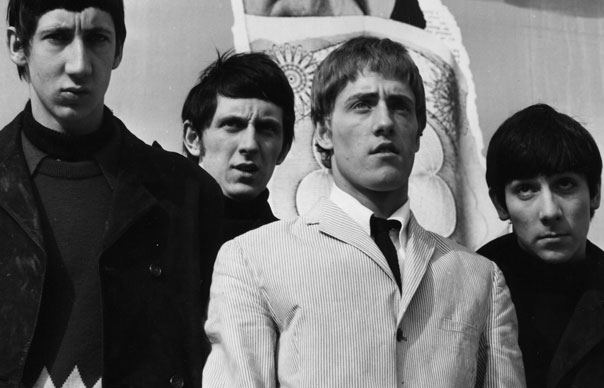In this feature from the Uncut archive, Roger Daltrey reviews his side of The Who's story, providing track-by-track commentary on 20 of The Who’s most explosive singles. From Uncut's October 2001 issue (Take 68). Words: Simon Goddard _______________________ A miserable October day in London,...
5.15 (Townshend)
Producer: The Who
B-side: Water (Townshend)
Released: October 1973
Highest UK chart position: 20
Were it not for the cult of its 1979 celluloid namesake, it’s unlikely that The Who’s Quadrophenia would have earnt its hallowed status in mod culture. The irony of a musical set in the mid-’60s about a disaffected young scooter-boy told through the medium of ’70s rock at its most progressive and inflated was, and still is, overriding.
Entwistle and Daltrey would both criticise its unsatisfactory mix, while outside the studio graver troubles were stirring. A week before its inaugural live performance, rehearsals disintegrated in a scrap between Townshend and Daltrey, ending in the former’s temporary hospitalisation with amnesia. To cap it all, the Quadrophenia tour was a shambles, blighted by wonky backing tapes and Townshend’s arduous narration between numbers.
Nevertheless, in “5.15” The Who pulled another bombastic rock 45 out of the bag that, like “Pinball Wizard”, held its own when divorced from its parent concept. Against a Stax-like Memphis soul stew of vamping brass and call-and-response vocals, Daltrey becomes “Jimmy”, pilled “out of his brain” on a regular commuter train. Reluctantly, The Who agreed to plug “5.15” on Top Of The Pops – an alien environment for any self-respecting ‘serious rock group’ in 1973 – but heroically smashed their equipment and earnt a life ban from BBC club premises after Townshend flicked a two-finger salute at the show’s producer and Moon attacked a steward who refused him entry to the bar.
Emotionally raw after the recent breakdown of his marriage, barely six weeks later at a show in San Francisco Moon would collapse behind his kit mid-song after “mistakenly” downing gorilla tranquillisers. While medics rushed to his aid backstage (unbelievably, the gig continued with a replacement plucked from the audience), Townshend informed the crowd, “You’ll have to wait – without him, we’re not a group.”
Daltrey: “I was much more comfortable as a singer by Quadrophenia. Jimmy I found a really easy character to sing, but my main regret on that album is the recording process. Ron Nevison, who was the producer at the time with Pete, recorded it with echo on the vocal which can never be removed now. It just makes the vocal sound thin. It was the biggest recording mistake we ever made. The echo diminishes the character as far as I’m concerned. It always pissed me off. From day one I just fucking hated the sound of it. He did that to my voice and I’ve never forgiven Ron for it. That brass on ‘5.15’, though, is all John. He played everything. Really, it was the only single on Quadrophenia we could have released.”
________________________
Squeeze Box (Townshend)
Producer: Glyn Johns
B-side: Success Story (Entwistle)
Released: January 1976 (UK)
Highest UK chart position: 10
Thanks to that year’s Ken Russell feature film adaptation, by 1975 Tommy was still proving to be a lead weight around their necks, a matter which depressed Townshend no end. After a near two-year lay-off (punctuated only by 1974’s Odds And Sods collection), with rumours of a split ricocheting around the music press, their next album proper – Who By Numbers – would be Townshend’s bitterest collection yet; a stark exorcism of his demons from alcoholism (“However Much I Booze”) to industry paranoia (“How Many Friends”).
Having taken their eyes off the singles market, it was odd, then, that the album’s least representative track – the innocuous, knee-slapping “Squeeze Box” with its bawdy innuendo (“we all knew it was about tits,” mused Entwistle) – should provide The Who with a hit single three months later, particularly since its composer claimed he’d written it while trying to master the accordion in just 10 minutes.
Daltrey: “Who By Numbers is very dark because Pete was going through some terrible agonies, but I didn’t realise this at the time. He was also starting to write himself into a very cosy situation where nothing was shared, which put the rest of us in a very difficult position because you don’t want to upset a working apple cart. We thought, if he wants space, we’ll give him some space – when what we should have done was been there saying, ‘You all right, Pete?’ But that’s just the way he was and still is. There’s a side to him that is like a stone wall and what he really wants you to do is knock down the fucking wall and come through it, which takes a lot of effort all the time. I understand it now but I didn’t understand it then. So it led to this brooding, deep, introspective album. He was boozing a lot and I think he was having problems with his marriage, trying to balance that family life with rock’n’roll. Cos they don’t balance. But I love that album.
“What’s great about ‘Squeeze Box’ is that it’s so refreshingly simple, an incredible catchy song. A good jolly. I’ve never had a problem with that song because it doesn’t pretend to be anything other than what it is and I love it for that. Live audiences love it. Nothing wrong with a bit of ‘in-and-out’, mate!”



